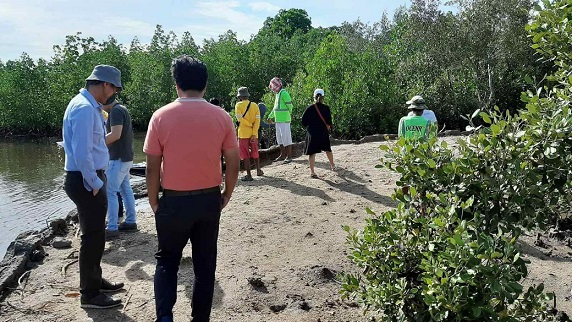The Nature-based solutions in protecting urban mangrove forests initiated by USAID Climate Resilient Cities Zamboanga City Project was cited for Best Practices of the “Marine Protected Area Awards and Recognition” during the virtual Mindanao Regional Forum Wednesday, Dec. 7.
Zamboanga City’s Nature-based Solution (NbS) in Building Empowered and Resilient Communities for Socio-Economic Development and Partnerships in Safeguarding its Central Mangrove Forest was presented by forester Gerry R. Pollisco, assistant City Environment and Natural Resources officer, who also chairs the Technical Working Group of the USAID Climate Resilient Cities Zamboanga City Project.
The project provides for actions to protect, sustainably manage, and restore natural or modified ecosystems to address societal challenges and SDGs while providing human well-being and biodiversity benefits.
It covers five categories, such as restorative (ecological restoration, forest landscape restoration, ecological engineering); issue-specific (ecosystem-based adaptation, mitigation, disaster risk reduction and climate adaptation services); infrastructure (natural infrastructure and green infrastructure); management (integrated coastal zone management and integrated water resources management) and; protection (area-based conservation approaches, including protected area management and other effective area-based conservation measures).
Covered areas are the mangroves (forestland) traversing seven village communities within the urban center – the coastal barangays of Arena Blanco, Kasanyangan, Mampang, Mariki, Rio Hondo, Talon-talon, and Tugbungan for shoreline protection, sustenance and provisions of ecological services. These areas are vulnerable to natural disasters and stresses of climate change.
Other LGUs Best Practices cited were the Academe-LGU-community partnership of Samal Island, Davao City; Private-Public Partnerships in MPA Management of General Santos City and; the Connectivity considerations in Designing MPA networks (UPMSI).
The Climate Resilient Cities Project is implemented by USAID and the Catholic Relief Services in collaboration with Conservation International, Philippine Disaster Resilience Foundation, University of the Philippines Resilience Institute, and Rocky Mountain Institute. (Vic Larato, photo courtesy by Ed Bisquera)
(Source: City Government of Zamboanga Facebook page)

